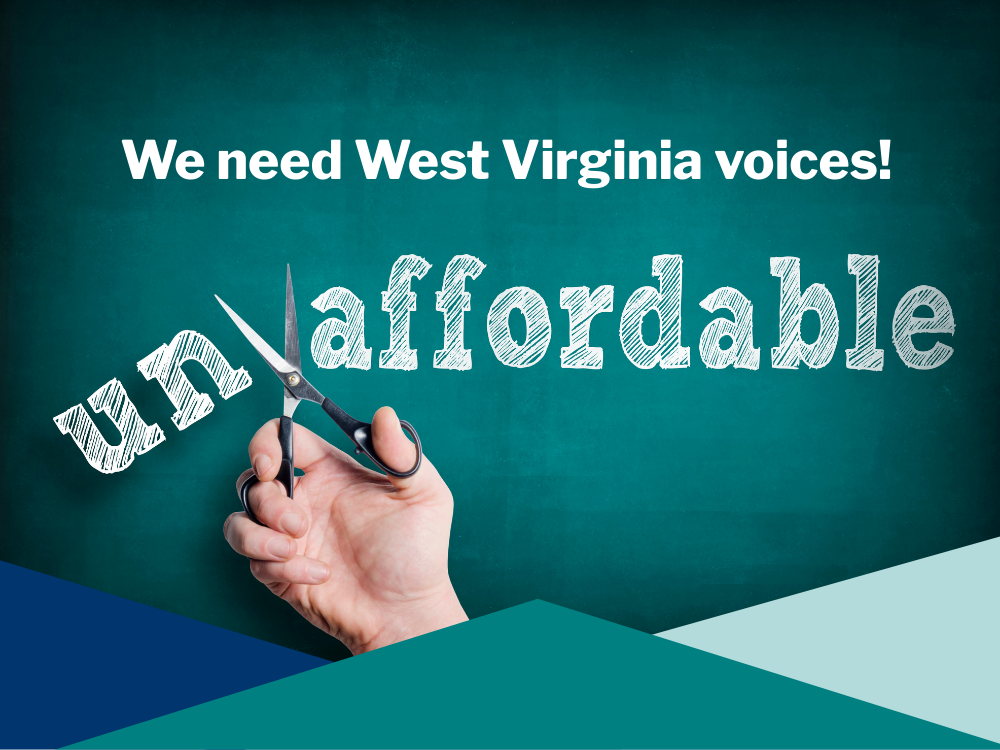- Like
- Digg
- Del
- Tumblr
- VKontakte
- Buffer
- Love This
- Odnoklassniki
- Meneame
- Blogger
- Amazon
- Yahoo Mail
- Gmail
- AOL
- Newsvine
- HackerNews
- Evernote
- MySpace
- Mail.ru
- Viadeo
- Line
- Comments
- Yummly
- SMS
- Viber
- Telegram
- Subscribe
- Skype
- Facebook Messenger
- Kakao
- LiveJournal
- Yammer
- Edgar
- Fintel
- Mix
- Instapaper
- Copy Link
Dear Senator Manchin, Senator Capito, and Representatives McKinley, Mooney, and Jenkins:
As Congress begins its work on the FY 2018 budget, we are writing to urge you to ensure that funding is adequate to meet the needs of all people and communities. The undersigned are organizations from West Virginia including faith groups, human service providers, labor and civil rights organizations, and advocates and policy experts concerned with improving our nation’s health, protecting our environment, supporting families, reducing poverty and hunger, strengthening our communities, and investing in economic growth and prosperity for all our people.
Our message to you is clear: there is no way to keep the promise of prosperity for all people in West Virginia and all Americans, including families with children, women, seniors, people with disabilities, communities of color, and others who are being left behind in the 21st century economy, without significantly increasing investments in public education, affordable housing, health and nutrition, public transit, roads and bridges, clean air, clean water, clean energy, child care, and other means of making investments in communities that also create good jobs.
Rather than meeting these goals, President Trump’s FY 2018 budget, however, proposes harsh reductions in all these areas, cutting domestic and international discretionary (NDD) programs $54 billion below the current law’s sequester cap and transferring those funds to the Pentagon.
West Virginia relies on federal funding for 21 percent of its state budget. These proposed cuts would be devastating, and we urge you to oppose them. Some of the most egregious examples of the pain that would be caused by the Trump budget cuts include:
• Denying medical care to well over 23 million people nationwide because the budget slashes Medicaid deeply, inflicting a 47 percent cut ($1.6 trillion) through 2027. If the restrictive caps included in the budget were in place in West Virginia from 2001-2011, the state would have lost over $1.92 billion in federal Medicaid funds.
• Ending the federal commitment to provide a minimum basic food benefit through SNAP/food stamps, by shifting 25 percent of the cost to states. West Virginia would face a 10-year cost of $869 million, but if such funds were not available, could instead cut benefits. In addition, 24,000 people in West Virginia, mostly elderly and people with disabilities, would lose SNAP benefits because the minimum benefit would be eliminated.
• Breaking the promise not to cut Social Security by slashing Social Security Disability Insurance (SSDI) and Supplemental Security Insurance (SSI) by $72 billion over 10 years. There were 139,409 working-age adults in West Virginia with disabilities receiving SSDI and/or SSI in December 2015, 12.4 percent of West Virginia’s 18-64 year olds.
• Eliminating heating assistance for 75,493 people in West Virginia by cutting $28.9 million from the state’s Low-Income Energy Assistance Program (LIHEAP).
• Reducing the number of rental vouchers for low-income families by 250,000 nationwide. That loss of rental assistance would be more than double the 2013 sequester cuts of 85,697 vouchers, which denied rental assistance to 319 families in West Virginia.
• Eliminating $6.97 million for 21st Century Learning Grants to support before and afterschool care and summer programs for 6,972 children in West Virginia.
• Cutting West Virginia’s state grant from the Environmental Protection Agency (EPA) by 45%, a loss of $4.8 million to fund efforts to implement environmental programs for clean water and clean air that protect public health.
• Cutting 27% of federal assistance to enable job training placements, cutting funds for 15,148 people in West Virginia.
Rather than budget cuts, we urge you to support a budget that is an engine for economic progress. It must provide enough funding for jobs and infrastructure programs, with targeted help for low-income communities and struggling individuals, including immigrants seeking a better life.
A good budget will direct funds to job creation, not more incarceration; and ensure funding for programs that alleviate poverty, targeting funds to reduce disproportionate poverty among people of color, especially children. All people in West Virginia deserve the security of being able to sustain basic living standards. Social Security, Medicare, Medicaid, the Supplemental Nutrition Assistance Program (SNAP), Supplemental Security Insurance (SSI), unemployment insurance, and refundable tax credits for low-income people are essential programs that should be protected and improved, not cut.
We urge you to reject structural limits to these programs such as block grants or per capita caps, restrictions in eligibility or benefits that deny assistance to people in need and only worsen barriers to stable employment. Our national security depends on adequately funded protections against threats to public health, as well as protections against poverty, hunger and homelessness, without regard to race, ethnicity, gender, or immigrant status.
It is necessary, but not sufficient, to reject the extreme cuts in the Trump budget. FY 2017 funding shows the harm that comes from years of flat or reduced funding due to tight caps. Out of 168 program areas serving low-income people tracked by the Coalition on Human Needs, 135 were cut from FY’s 2010 – 2017, taking inflation into account; 54 were cut by more than 25 percent.
We must do better. At minimum, Congress must undo the unrealistic sequester cap on NDD programs and maintain the bipartisan commitment to parity in funding beyond the caps, matching any defense increase with the same amount for NDD programs. Further, cutting domestic programs to fund increases in military spending or tax cuts is wholly unacceptable. On the contrary, investments should increase to meet our nation’s huge and growing unmet needs.
A responsible budget requires an increase in revenues from fair sources to fund needed investments. The President’s call for more than $5.5 trillion in tax reductions overwhelmingly benefits profitable corporations and wealthy individuals.
The President’s tax plan is not responsible, and its promise of unprecedented economic growth is not credible. We also strongly urge you to reject the inclusion of reconciliation instructions in the budget resolution intended to force cuts and restrictions in programs that support basic living standards and instructions that would expedite unfair tax breaks for wealthy individuals and profitable corporations.
We also urge you to reject controversial ideological policy riders that threaten to stall the budget process, potentially preventing states and localities from receiving federal resources in a timely manner. Policy provisions of great consequence to workers, retirees, consumers, and the environment should receive thorough consideration by authorizing committees and not be slipped into spending bills.
Congress must produce a budget that moves us towards more opportunity for all, that safeguards and advances our basic living standards, and that protects our environment.
Sincerely,
Gary Zuckett
Executive Director, WV Citizen Action Group



